|
A New Testamentthe rise of the christian church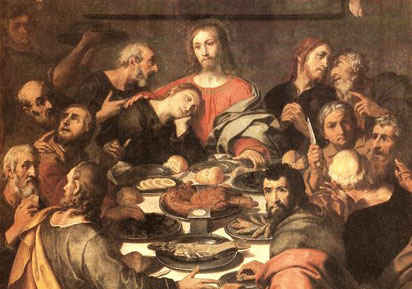 With the rise of the Christian Church as an entity unto itself, a new era in the formation of the Bible had arrived. There were once numerous texts in circulation among the various Christian communities, including various Letters, Gospels, and Acts of the Apostles that are not included in modern Bibles. Naturally the party line parroted by the Roman Catholic Church and various Protestant sects is that all these texts were simply silly, worthless drivel (or worthless yet harmful heresy), correctly removed from the Bible by right-minded religious leaders acting on divine inspiration.
With the rise of the Christian Church as an entity unto itself, a new era in the formation of the Bible had arrived. There were once numerous texts in circulation among the various Christian communities, including various Letters, Gospels, and Acts of the Apostles that are not included in modern Bibles. Naturally the party line parroted by the Roman Catholic Church and various Protestant sects is that all these texts were simply silly, worthless drivel (or worthless yet harmful heresy), correctly removed from the Bible by right-minded religious leaders acting on divine inspiration.
Originally there were roughly 25 or 30 variations of the Gospels alone, but by the time of the Muratorian Canon (180 AD), only four of these were included among the scriptures of the Bible—Mark, Matthew, Luke, and John. The criteria for inclusion were:
One famous example to fall in this category is the Gospel of Barnabas. Although Church records do note an early Gospel of Barnabas having existed in the 6th century, the famous Gospel of Barnabas was an 14th-century Muslim apologetic forgery. That is, it was written to explain away those aspects of Jesus and his works that were offensive to Muslims, and to bring Jesus into line as a minor prophet in contrast to the later Mohammed. (In the Gospel of Barnabas, Jesus refers to Mohammed as the greater of the two whose shoelaces he is not worthy enough to untie.) On the other hand, some of the deleted books were written with great authenticity and contained no actual heresy, but they made the Church look bad by mixing honest doctrine with ideas that might appear foolish or shocking. For example, the First Epistle of Clement to the Corinthians was originally included as part of official Church scripture but was later deleted—the objection being that Clement likens Christ's resurrection to the rising of the Phoenix from its own ashes. This might have been fine had he referenced the Phoenix as a mythological being, but instead he refers to it as a real bird that existed in the physical world. Readers might draw the conclusion that Christ and his miracles, also referenced by Clement, had no more reality than the imaginary Phoenix.
It is worth noting that not all scholars agree as to what is and is not pseudepigrapha. For example, there are still some who argue in favor of including The Assumption of Moses as authentic scripture. At the same time, there are books of the Bible that are currently counted as authentic scripture even though they are filled with suspicious discrepancies and anachronisms. Clearly, the basis of selection is less than rational and objective. The early Church was an institution rife with dissent and political factionalism. Different groups sought to put forth their own vision of Christ as officially vetted Church teaching. Later, the political and ideological entity that emerged as the official Church (and the official state religion of Rome) sought to suppress rival viewpoints and alternative perspectives. Thus many books were removed from the Bible simply for the sake of political maneuvering or spiritual small-mindedness.
Ironically, as much as Church leaders (and followers) would like to believe that they were guided by the hand of God in all such decisions, one cannot help but wonder if, in reality, it is the "hand of God" that is redressing their deletions as more and more chance discoveries lead to the recovery of suppressed scriptures. Thus the Gospel of Peter finally re-entered public awareness after a portion of it was discovered in a codex buried with a monk in Akhmîm, Egypt in 1886. This serendipitous find would foreshadow the later discovery of the Gospel of Thomas in Egypt in 1897. Fragmented, the Gospel of Thomas would not be more fully known until 1945 when a complete version in Coptic (an Egyptian language written in Greek derived alphabet) was discovered at Nag Hammadi. (Note that later, in 1958, the caves of Qumran yielded up the oldest Old Testament scrolls ever found, as well as other writings which date to the same era as New Testament works.)
Jesus said, "The Pharisees and the scribes have taken the keys of knowledge (gnosis) and hidden them. They themselves have not entered, nor have they allowed entering those who wish to. You, however, be as wise as serpents and as innocent as doves."It would appear that the situation Jesus described was little changed by the advent of a new religion and a new religious hierarchy. Fear and the lust for power were as much a part of the gentile world as the Jewish world. The new (Christian) set of priests and scribes simply took the new set of scriptures as well as the old ones, blurring the very knowledge they were supposed to pass along. Unfortunately it is beyond the scope of this article to discuss all of the deleted or excluded texts. In point of fact, there are enough suppressed gospels, lost books, and hidden letters for their discussion to fill several books and websites. But we would be remiss if we did not give mention to the one text that surely gave early Church fathers fits, or at least those of them that knew about it—the Secret Gospel of Mark.
More specifically, it is possible that some of these inner teachings involved a more "sexual Jesus", and that the man who inspired millions to a life of chastity may have incorporated sex into his initiatory techniques. Whether or not this is so, the Secret Gospel of Mark certainly echoed the anti-authoritarian Gospel of Thomas, in that it undermined adherence to religious tradition and encouraged living outside the box. By contrast, the later Christian Church (first Catholic and later Orthodox and Protestant) would emphasize—upon pain of death—the absolute necessity of conforming to "tradition" and to the will of those with the power of safeguarding and defining it (whether Pope, Presbyter, or Anglican King).
By contrast, both suppressed Gospels, as well as tidbits from within the sanctioned Gospels, imply that according to Jesus, the Kingdom of Heaven is here now. However, to access it—to experience it—would require a change of perception, a shift in the beliefs that would allow an ensuing shift in perception (and thus in daily life experience). Jesus' actual words, "The Kingdom of Heaven is at hand" are cited by Modern scholars as a key example of how the teachings of Jesus could be, and were, taken in different ways by different people. St. Clement, from whose letter the scrap of Secret Mark was lifted, comments that there were secret, inner teachings, intended only for those being "perfected"; meaning those who were sufficiently advanced to receive them. With the passing of Jesus, or perhaps with the passing of the original Apostles (though the Gospel of Thomas implies that most of them had been too dense to comprehend the inner teachings anyway), the possibility for individuals to be initiated into these teachings directly appears to be lost. If there continued to be those among the Church able to conduct such teachings, we as members of the public at large don't hear about it. And certainly, the teachings of most Christian leaders don't betray a philosophy such as is pointed at by the Gospels of Thomas and Mark. Writings treating this matter exist only in recovered fragments (such as Clement's letter, the Thomas materials from Nag Hammadi, etc.) that hint at the Church's suppression of such doctrines.
But as each community added on its own additional practices and explanations, it put the Church as a whole in danger of fragmentation. Additionally, in the eyes of Church leaders, commissioned by the Apostles, to add such "filler" is to deviate from what was directly handed down from Jesus and to lose the genuine legacy. Even to emphasize the fragments of teaching captured in the written Gospels, they claimed, is to deny this legacy. Precious little of what was handed down orally from Master to Apostles to community had been transcribed. Finally, in response to these threats to Church stability and legacy, Clement wrote, "Let us cease to make vain searches, let us come to the glorious and venerable fixed rule (canona) that has been handed down to us." In other words, even if what they've got seems sketchy or dubious, they must stick with it because it's all they've got—or at least all that is fit to be shared with the mob. To add anything not directly handed down through official channels, from Jesus to the Apostles to the Bishops, is to risk going terribly astray. Meanwhile, Church leaders like himself deliberately withheld the fullness of Jesus' teachings, as unfit for the masses.
Interestingly enough, another factor that may have helped shape this outcome of secrecy and suppression was the violent effort of the (pagan) Roman Empire to stamp out the Christian movement. This effort, which escalated after Nero scapegoated the Christians for a devastating fire in 64 A.D., may have effectively wiped out many who were familiar with the earliest doctrines of Jesus and the Apostles, leaving interpretation of the teachings more profoundly to the martyrdom/doomsday cult of Clement and his Catholic successors.
|
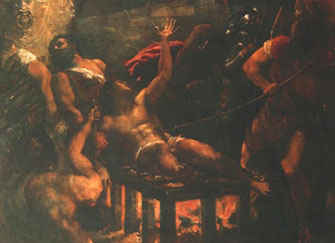
 Additionally, some books were proved to be pseudepigrapha, meaning they pretended to be an additional account of some well-known biblical character, or they were written in imitation of a pre-established biblical author. Examples include The Assumption of Moses, The Books of Adam and Eve, and The Testament of Abraham. Many such texts had once been treated as authentic scripture handed down from antiquity, when in fact they were of relatively recent origin. Such books are generally given away by their anachronisms, referencing events or cultures that had not yet occured or come into existence at the time when the book allegedly written.
Additionally, some books were proved to be pseudepigrapha, meaning they pretended to be an additional account of some well-known biblical character, or they were written in imitation of a pre-established biblical author. Examples include The Assumption of Moses, The Books of Adam and Eve, and The Testament of Abraham. Many such texts had once been treated as authentic scripture handed down from antiquity, when in fact they were of relatively recent origin. Such books are generally given away by their anachronisms, referencing events or cultures that had not yet occured or come into existence at the time when the book allegedly written.
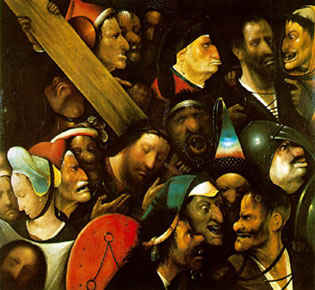 The Gospel of Peter, for example, was struck for the following heretical passage: "And they brought two criminals and crucified the Lord between them. But he himself remained silent, as if in no pain." In the minds of Church leaders, the assertion that Jesus showed no sign of pain could have been used to back up Docetae assertions that the body of Jesus was not material (i.e. of flesh and blood), but rather a mere phantom or spiritual projection. The text was therefore excluded from scripture. Meanwhile modern scholars protest that the passage actually aligns with references in Isaiah 53:7 about the silence of the "suffering servant". Hence, Christ's supposed silence during the
The Gospel of Peter, for example, was struck for the following heretical passage: "And they brought two criminals and crucified the Lord between them. But he himself remained silent, as if in no pain." In the minds of Church leaders, the assertion that Jesus showed no sign of pain could have been used to back up Docetae assertions that the body of Jesus was not material (i.e. of flesh and blood), but rather a mere phantom or spiritual projection. The text was therefore excluded from scripture. Meanwhile modern scholars protest that the passage actually aligns with references in Isaiah 53:7 about the silence of the "suffering servant". Hence, Christ's supposed silence during the 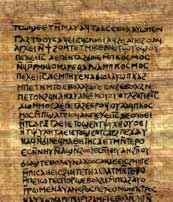 When it was discovered, The Gospel of Thomas greatly intrigued religious scholars as it differed markedly from the canonical gospels handed down by the Church. Unlike the Gospels of Luke, Matthew, Mark, and John, it does not attempt to tell the story of Jesus' life, but rather shares a collection of his sayings. These aphorisms were apparently collected by the apostle Thomas during his time with Jesus and in some instances represent "inner teachings" which Jesus shared—perhaps exclusively—with him. The Gospel of Thomas presents a mystical, one might even say metaphysical, side to the teachings of Jesus, placing an emphasis on inner knowing (i.e. through direct attunement to God via the spirit self). No doubt this encouragement to seek spiritual guidance within the self was threatening to Church leaders, who naturally wanted to be in control of spiritual doctrine and, through it, the way in which people acted.
When it was discovered, The Gospel of Thomas greatly intrigued religious scholars as it differed markedly from the canonical gospels handed down by the Church. Unlike the Gospels of Luke, Matthew, Mark, and John, it does not attempt to tell the story of Jesus' life, but rather shares a collection of his sayings. These aphorisms were apparently collected by the apostle Thomas during his time with Jesus and in some instances represent "inner teachings" which Jesus shared—perhaps exclusively—with him. The Gospel of Thomas presents a mystical, one might even say metaphysical, side to the teachings of Jesus, placing an emphasis on inner knowing (i.e. through direct attunement to God via the spirit self). No doubt this encouragement to seek spiritual guidance within the self was threatening to Church leaders, who naturally wanted to be in control of spiritual doctrine and, through it, the way in which people acted.
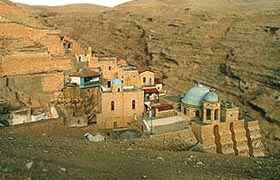 The Secret Gospel of Mark was rediscovered in 1958 at the Mar Saba Monastery near Jerusalem. Much maligned since its translation, the work has been vilified not for any explicit doctrine but for what might be implied and inferred from the little that is included in its remnant pages. To begin with, the fragments of the Secret Gospel—and the letter in which it is contained—point to the teachings of Jesus being two-fold. That is, that the public teachings, only vaguely described in the Bible, were accompanied by private teaching, available only to select individuals through private initiation.
The Secret Gospel of Mark was rediscovered in 1958 at the Mar Saba Monastery near Jerusalem. Much maligned since its translation, the work has been vilified not for any explicit doctrine but for what might be implied and inferred from the little that is included in its remnant pages. To begin with, the fragments of the Secret Gospel—and the letter in which it is contained—point to the teachings of Jesus being two-fold. That is, that the public teachings, only vaguely described in the Bible, were accompanied by private teaching, available only to select individuals through private initiation.
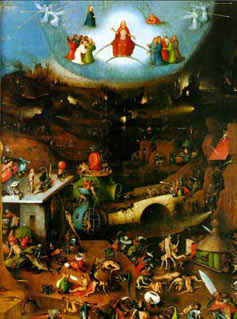
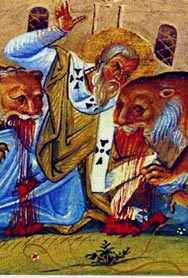 With the death of the Apostles, the power of the Church became more and more centered in the Church in Rome. Official doctrine was solidifying; at the same time heresies sprang up as Christian communities sought a more meaningful understanding of their faith. It is as if a vacuum existed, as if they themselves found the mainstream remnants of Jesus' teachings to be insubstantial and insufficient—as if something more, some further explanation or doctrine were held back from them.
With the death of the Apostles, the power of the Church became more and more centered in the Church in Rome. Official doctrine was solidifying; at the same time heresies sprang up as Christian communities sought a more meaningful understanding of their faith. It is as if a vacuum existed, as if they themselves found the mainstream remnants of Jesus' teachings to be insubstantial and insufficient—as if something more, some further explanation or doctrine were held back from them.
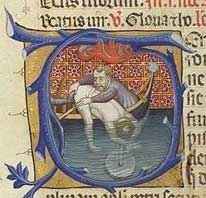 As the power of the Roman Church became centered in the person of Clement, and later in his successors, this attitude and approach to doctrine (emphasis on orthodoxy and conformity, suppression of inner teachings) formed the foundation of what would eventually become the Roman Catholic Church. It is this body which would eventually wield astonishing power over the dissemination and distortion of both the Old and New Testament. In addition, through its eventual reign of bloody terror (both before and after the Inquisition), it would profoundly shape and delimit the minds of the Christians regarding the content of the Bible, it's inherent message, and appropriate reaction and conformity to that message.
As the power of the Roman Church became centered in the person of Clement, and later in his successors, this attitude and approach to doctrine (emphasis on orthodoxy and conformity, suppression of inner teachings) formed the foundation of what would eventually become the Roman Catholic Church. It is this body which would eventually wield astonishing power over the dissemination and distortion of both the Old and New Testament. In addition, through its eventual reign of bloody terror (both before and after the Inquisition), it would profoundly shape and delimit the minds of the Christians regarding the content of the Bible, it's inherent message, and appropriate reaction and conformity to that message.